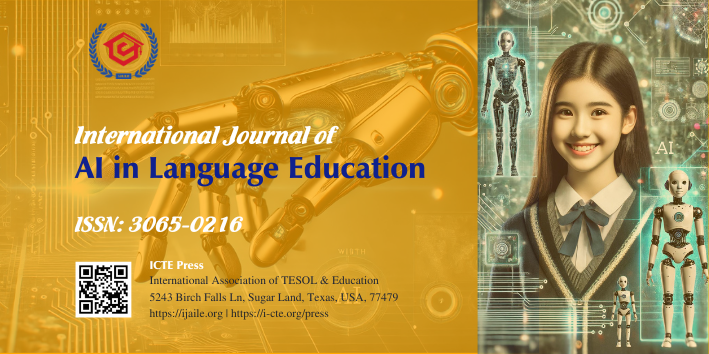AI in Language Education
Vol. 1 No. 1 (2024): AI in Language Education
Full Issue
- Full Issue (PDF)
Dear beloved Language Educators,
It is with immense pride and excitement that I announce the official launch of the International Journal of AI in Language Education (IJAILE) and its first-ever issue, Volume 1, No. 1, 2024. This journal marks a pivotal step in the exploration of Artificial Intelligence (AI) and its profound impact on language education. Through the hard work and dedication of our authors, reviewers, and editorial team, we are thrilled to present this collection of pioneering research.
This inaugural issue features insightful contributions from scholars who are pushing the boundaries of AI in language learning. Notably, Tran (2024) explores the effects of integrating AI tools like ChatGPT and QuillBot into academic vocabulary acquisition for Master’s students. Tran’s findings demonstrate the significant impact these tools have on enhancing student engagement and proficiency, particularly in academic writing.
In another thought-provoking study, Su and Tran (2024) investigate the benefits and limitations of ChatGPT in improving students’ writing skills. While highlighting improvements in vocabulary and structure, their study also addresses challenges like unreliable information and the risk of fostering lazy writing habits. Their work sheds light on the nuanced role of AI in writing instruction, particularly for tasks requiring academic rigor.
Pham (2024) provides valuable insights into the use of QuillBot by postgraduate students to enhance paraphrasing skills. While recognizing the tool’s effectiveness in expanding vocabulary and improving clarity, Pham also cautions against over-reliance and stresses the importance of critical thinking in academic work.
Le (2024) examines the perspectives of Master’s students on using Kahoot! and Quizlet to teach English vocabulary. Le’s research highlights how these gamified platforms motivate learners, improve vocabulary retention, and foster engagement, although careful integration is necessary to overcome challenges like distractions.
Finally, Nguyen and Pham (2024) explore the potential of AI-powered chatbots, such as ChatGPT, to enhance speaking practice. Their study emphasizes the importance of real-time feedback and low-stress environments for language learners. The authors also call for further research to address challenges such as cultural adaptability and feedback quality, especially in non-Western educational contexts like Vietnam.
These outstanding contributions would not have been possible without the unwavering commitment of our authors, the meticulous evaluations by our dedicated reviewers, and the tireless work of the editorial staff. I extend my deepest gratitude to each of you for your invaluable roles in making this issue a reality.
As we celebrate the launch of IJAILE, we look forward to continuing this exciting journey into the future of AI in language education. Together, we will explore innovative approaches that will transform how language learning is conducted around the globe.
Thank you for your support, and I hope you enjoy reading this inaugural issue.
Thanks God for everything!
Warm regards,
Assoc. Prof. Dr. Pham Vu Phi Ho
Editor-in-Chief
International Journal of AI in Language Education (IJAILE)





